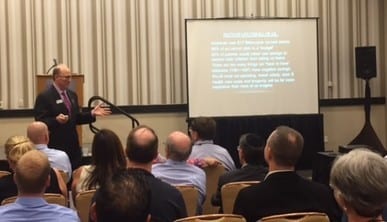How to Become the Millionaire Next Door

NARPM* 2015 Convention Workshop: The Millionaire Next Door
Speaker: Mark Kreditor, MPM® RMP®, Property Management Strategy NRT LLC
Fast Finance Facts:
- The average 401(k) balance is $72,000.
- Americans are $4.1 trillion short on what’s needed for retirement.
- 3 in 10 Americans have no emergency funds.
- 43% of Milliennals (18-27) say they will rely on loved ones when they retire.
- 40% of Millennials currently receive help from their parents
- Since 1982, the cost of college has gone up 439%.
- 71% of students forego their dream school
- 60% of students choose public vs private ($65k vs. $35k)
Financial Planning Advice:
- Creating an action plan is a better plan.
- Have quarterly financial meetings with those involved (spouse) to figure out where you are and so you can see trends.
- Don’t be afraid to hire an adviser or manager.
- Diversify and adjust as you age or get scared.
- As you get older, you will find you want less risk.
- Take a class and learn more about money and investments
- Try to keep your investments simple (couch potato) so you understand how your doing.
- Get informed by reading and watching programs about investing.
- You don’t have to be the smartest pencil in the box. Find someone smarter than you to advise you .
- Bonds and annuities are safest
Personal Finance Advice:
- Pay off your debt
- Don’t run up credit cards
- Pay off your car and keep it up to at least 100,000 miles
- Don’t overspend: There are too many things we have to have. Do you really have to have that?
- Try to never pay retail. People will match prices now like never before. Use your phone to search for the product at a cheaper price
- You must cut spending, invest wisely, and save more money.
- Health care cost and longevity will be far more expensive than most of us will imagine.
- Plan for your college, for your kids, and grandkids so you have enough to pay for the college when.
Investing/Retirement:
- Most important is diversification of investments
- You have to be willing to loose all of it or you have too much in it. Meaning you need to be oky with the worst case scenario
- You must have 3 – 6 months of expenses saved in the bank that you never touch. That’s your emergency fund.
- Home: don’t look at your home as something your gonna flip. Take the house out of the assets list you need a place to live.
- Stocks: read and understand enough of what’s going on to not lose money. Learn from those smarter than you. Get educated.
- Google couch potato to learn more about investing.
- Bonds: You should have the same percentage of bonds as your age. If you’re 57 you need 57% or your income in stocks and bonds.
- When you plan for the amount you need to retire, look at the last three years of expenses.
- Determine the accurate amount of money needed to live out the rest of your life. Agreeing on a conservative rate of return.
- Always plan with the end goal in mind. If you need $100,000 a year to live, add a 4% rate of return.
- Have an updated will with medical directive. Update it every 4 years or more often if you have big life changes.
- Remember your favorite charities. It needs to be part of the plan so you’ll rest better.
- Understand what your tax bracket is when you plan to withdraw taxable retirement funds.
- Always consider the worse case scenario and remember your first loss is your best loss.
Real Estate:
- Nothing wrong with investing in real estate unless you understand you will always have tenants moving out early, leaving you vacant, and you will always need to make ready the unit. Don’t expect to not have expenses.
- “Feces is always feces”: remember that when you buy real estate. Buy good quality real estate. Don’t hold on to something that’s sucking the life out of you.
* National Association of Residential Property Managers (narpm.org)
